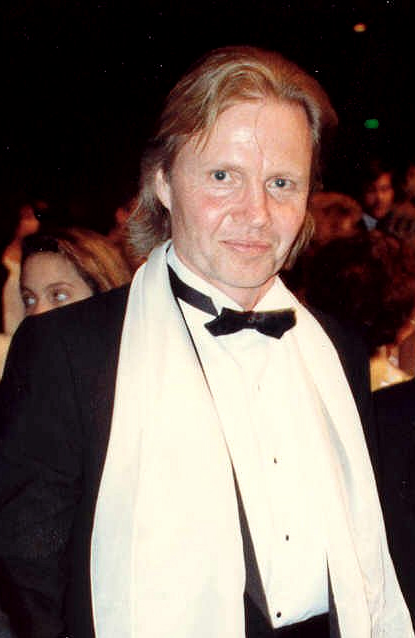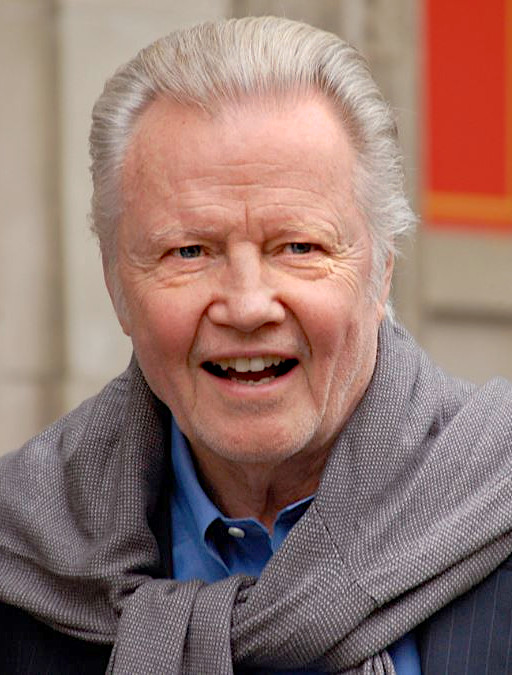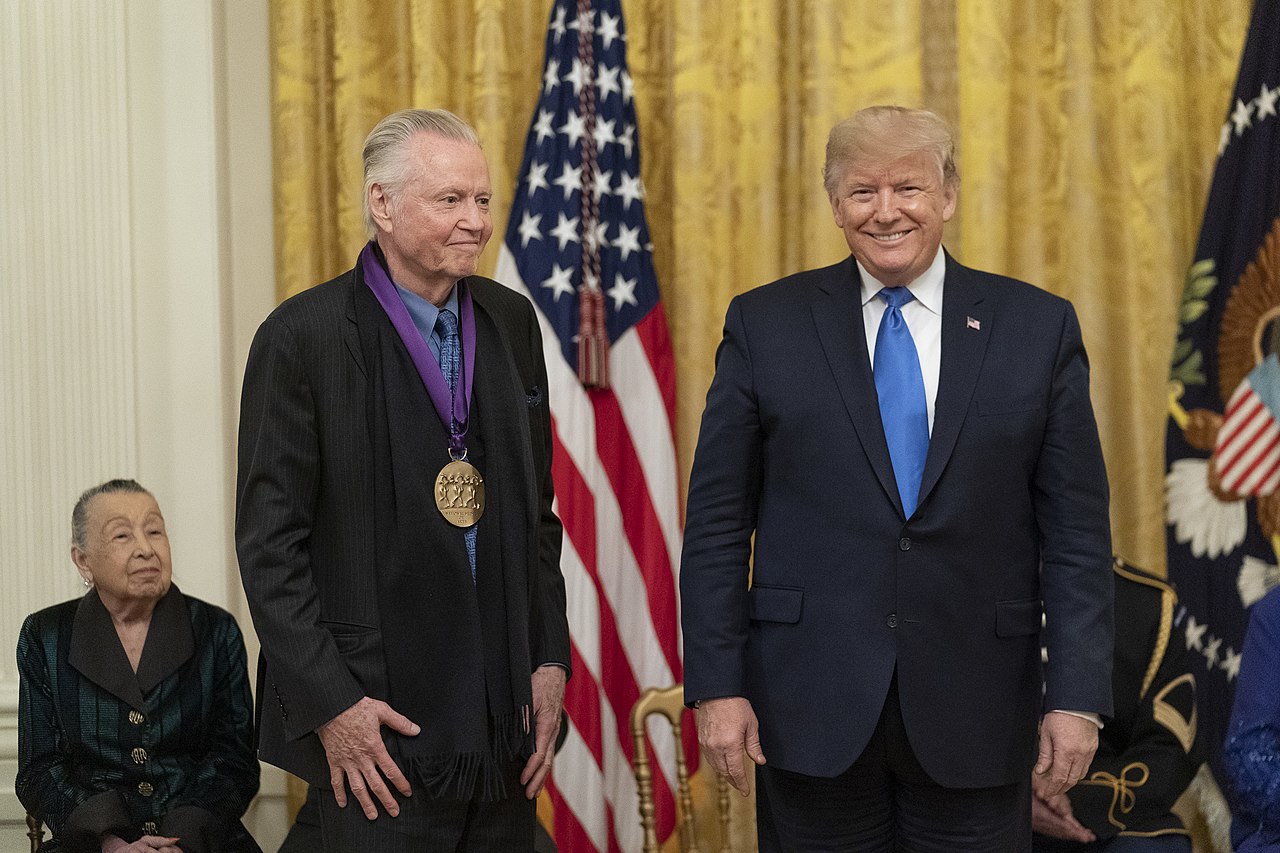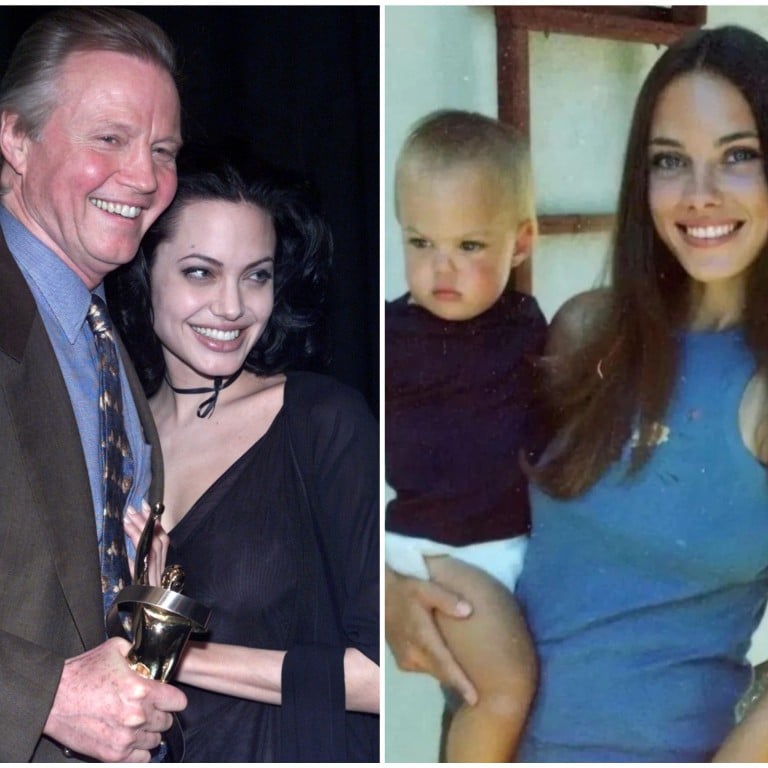Jon Voight
Jon Voight

Jonathan Vincent Voight, born on December 29, 1938, is an American actor known for his association with the angst and unruliness of the late-1960s counterculture. Voight has received numerous awards, including an Academy Award, a BAFTA Award, and four Golden Globe Awards. In 2019, he was honored with the National Medal of Arts. Films featuring Voight have grossed over $5.2 billion worldwide.
Voight won the Academy Award for Best Actor for his portrayal of a paraplegic Vietnam veteran in "Coming Home" (1978). He received Oscar nominations for his roles in "Midnight Cowboy" (1969), "Runaway Train" (1985), and "Ali" (2001). His notable film appearances also include "Deliverance" (1972), "The Champ" (1979), "Heat" (1995), "Mission: Impossible" (1996), "The Rainmaker" (1997), "Enemy of the State" (1998), "Pearl Harbor" (2001), "Zoolander" (2001), "Holes" (2003), "Glory Road" (2006), "Transformers" (2007), and "Pride and Glory" (2008). He is particularly recognized for his role in the "National Treasure" film series.
In addition to his film work, Voight has had notable television roles, including portraying Nazi officer Jürgen Stroop in "Uprising" (2001) and Pope John Paul II in the eponymous miniseries (2005). His role as Mickey Donovan on the Showtime drama series "Ray Donovan" earned him critical acclaim and his fourth Golden Globe win in 2014. Voight also appeared in the thriller series "24" during its seventh season.
Despite initially holding liberal views, Voight has become known for his outspoken conservative and religious beliefs in his later years. He is the father of actress Angelina Jolie and actor James Haven.
Jonathan Vincent Voight was born on December 29, 1938, in Yonkers, New York, to Barbara and Elmer Voight, a professional golfer. He has two brothers, Barry Voight, a former volcanologist at Pennsylvania State University, and James Wesley Voight, known as Chip Taylor, a singer-songwriter famous for songs like "Wild Thing" and "Angel of the Morning". Voight's paternal grandfather and his paternal grandmother's parents were Slovak immigrants, while his maternal grandfather and his maternal grandmother's parents were German immigrants. Political activist Joseph P. Kamp was his great-uncle through his mother.
Raised as a Catholic, Voight attended Archbishop Stepinac High School in White Plains, New York, where he first developed an interest in acting. After graduating in 1956, he enrolled at The Catholic University of America in Washington, D.C., majoring in art and earning a B.A. degree in 1960. Voight then moved to New York City to pursue an acting career, graduating from the Neighborhood Playhouse School of the Theatre, where he studied under Sanford Meisner.
Jonathan Voight began his off-Broadway career in a revue called O Oysters, which ran in early 1961. He made his Broadway debut in the fall of 1961 as Rolf in The Sound of Music. In the early 1960s, Voight found work in television, appearing in several episodes of Gunsmoke between 1963 and 1968, as well as guest spots on Naked City and The Defenders in 1963, Twelve O'Clock High in 1966, and Cimarron Strip in 1968. Voight's theater career took off in January 1965 when he played Rodolfo in Arthur Miller's A View from the Bridge in an Off-Broadway revival. However, Voight's film debut did not come until 1967 when he took a part in Phillip Kaufman's crimefighter spoof, Fearless Frank. He also had a small role in the 1967 western Hour of the Gun, directed by John Sturges. In 1968, he took a role in director Paul Williams's Out of It.
The breakthrough moment for Voight came in 1968 when he was cast in the groundbreaking film Midnight Cowboy (1969). He played Joe Buck, a naive male hustler from Texas, adrift in New York City, who comes under the tutelage of Dustin Hoffman's Ratso Rizzo, a tubercular petty thief and con artist. The film explored late 1960s New York and the development of an unlikely but poignant friendship between the two main characters. Directed by John Schlesinger and based on a novel by James Leo Herlihy, the film struck a chord with critics and audiences. Because of its controversial themes, the film was released with an X rating and would make history by being the only X-rated feature to win Best Picture at the Academy Awards. Both Voight and Hoffman were nominated for Best Actor, but lost out to John Wayne in True Grit.
In 1970, Jonathan Voight appeared in Mike Nichols' adaptation of Catch-22, and he also starred in The Revolutionary, directed by Paul Williams, portraying a left-wing college student struggling with his conscience. He then gained further acclaim for his role in the 1972 film Deliverance, directed by John Boorman, where he played one of the central characters embarking on a canoe trip in a wild, backwoods America. The film and Voight's performance received widespread critical acclaim.
Following Deliverance, Voight starred in a variety of films. In 1973, he played a directionless young boxer in The All American Boy and appeared in Conrack, based on Pat Conroy's autobiographical novel The Water Is Wide, portraying an idealistic young schoolteacher. In the same year, he also appeared in The Odessa File, a thriller based on Frederick Forsyth's novel, where he played a young German journalist uncovering a conspiracy involving former Nazis.
Voight turned down the role of Matt Hooper in Steven Spielberg's Jaws in 1975, but in 1978, he delivered a remarkable performance as the paraplegic Vietnam veteran Luke Martin in Hal Ashby's film Coming Home, winning Best Actor at the Cannes Film Festival and an Academy Award for Best Actor. The film also starred Jane Fonda, and their on-screen chemistry received significant attention.
In 1979, Voight starred in the remake of The Champ, portraying an alcoholic ex-heavyweight boxer, and in 1982, he co-wrote and co-produced Lookin' to Get Out, where he played a con man in debt with New York mobsters. He also produced and acted in Table for Five in 1983.
Voight's acclaimed performances continued into the 1980s, with his role as escaped convict Oscar "Manny" Manheim in Runaway Train (1985), for which he received an Academy Award nomination for Best Actor and won a Golden Globe Award. He also starred in Desert Bloom (1986) and experienced a "spiritual awakening" toward the end of the decade.
In 1989, Voight starred in and helped write Eternity, a film dealing with a television reporter's efforts to uncover corruption. Throughout this period, Voight continued to demonstrate his versatility as an actor and his commitment to diverse and challenging roles.
References
- "Jon Voight". Rotten Tomatoes. Retrieved April 17, 2023.
- ^ "President Donald J. Trump to Award the National Medal of Arts and National Humanities Medal". White House. Retrieved November 21, 2019 – via National Archives.
- ^ "Top Stars at the Worldwide Box Office (Rank 301-400)". The Numbers. Archived from the original on February 1, 2024. Retrieved February 1, 2024.
- ^ "Jon Voight: "I have to say my piece"". CBS News. April 25, 2021. Retrieved April 17, 2023.
- ^ "Jon Voight Thinks He and Donald Trump Are in "Our Greatest Fight Since the Civil War"". Vanity Fair. November 11, 2020. Retrieved April 17, 2023.
- a b c "Jon Voight | Biography, Movies, & Facts". Encyclopædia Britannica. Retrieved December 2, 2020.
- ^ Hal Erickson (2008). "Jon Voight bio". Movies & TV Dept. The New York Times. Archived from the original on June 10, 2008. Retrieved June 10, 2009.







































